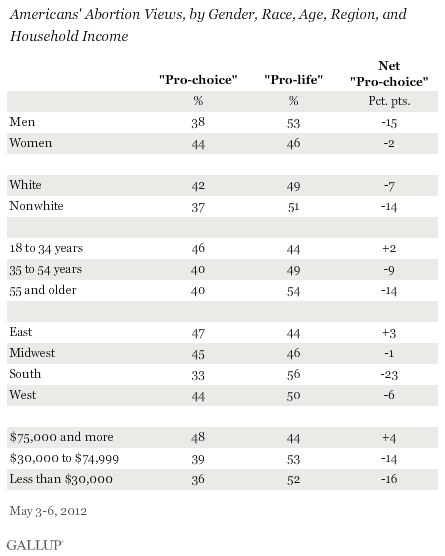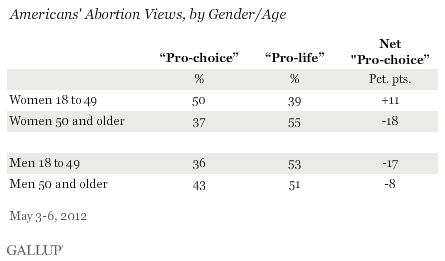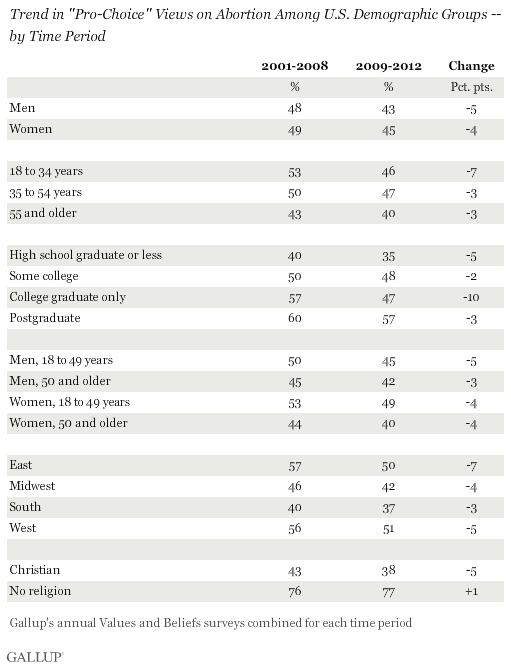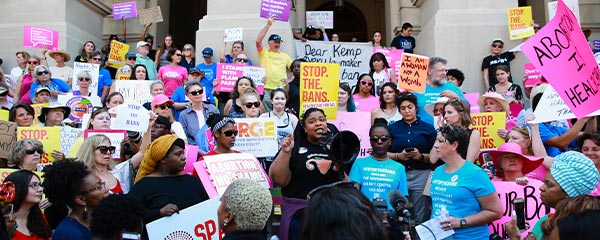PRINCETON, NJ -- Most subgroups in the United States tend to describe their views on abortion as "pro-life" rather than "pro-choice," reflecting the views of all U.S. adults. However, apart from the partisan distinctions in abortion ID that Gallup reviewed last week, there are two major exceptions to this -- postgraduates and nonreligious Americans, both of whom lean heavily pro-choice.

Americans with no religious attachment (self-identified atheists, agnostics, and those with simply no religious preference) identify as pro-choice by a 49-percentage-point margin over pro-life, 68% to 19%. This represents the strongest propensity toward the pro-choice position of any major U.S. demographic (as distinct from political) subgroup. This group is also more heavily pro-choice than Democrats, but its views are similar to those of political "liberals," 74% of whom are pro-choice and 19% pro-life.
In contrast to Americans with no religious affiliation, majorities of those who identify with either of the two major U.S. Christian faiths call themselves pro-life: 54% of all Catholics and 57% of Protestants. The sample size of those who identify with a non-Christian religion is too small to allow meaningful interpretation.
The gap in abortion views by education is not as wide as that seen between Christians and non-Christians, but is still stark. Nearly six in 10 Americans with postgraduate education call themselves pro-choice and 37% are pro-life -- a 21-point lead for the pro-choice position. The figures are nearly reversed among those with no college education, resulting in a 20-point "pro-life" lead. Americans whose highest level of education is either an undergraduate degree or some college education tilt pro-life by eight-point margins.
These results are from Gallup's annual Values and Beliefs poll, conducted May 3-6. While the poll found a significant decline in self-identification as pro-choice, Americans' more basic views of the legality of abortion were unchanged this year.
Men, Nonwhites, and Southerners Are Among the Most "Pro-Life"
The same poll finds men identifying as pro-life over pro-choice by a 15-point margin, 53% vs. 38%. Women, on the other hand, are about evenly split at 46% pro-life and 44% pro-choice.
Additionally, nonwhites (including blacks, other minority races, and Hispanics) are more likely to be pro-life than are whites; and the same is true of adults 35 and older versus those aged 18 to 34; and mid- to low-income versus upper-income Americans.
Regionally, the South stands out as the only major U.S. region displaying a clear preference on the abortion issue -- that being pro-life, by a 23-point margin. Residents of the East, Midwest, and West are more evenly divided between the pro-life and pro-choice standpoints.

Beyond the overall gender views on abortion, Gallup finds that women aged 18 to 49 are more likely to identify as pro-choice than as pro-life, while women 50 and older are more likely to say they are pro-life. By contrast, men's views by age are similar, with just over half in both age groups saying they are pro-life.

Current Results Largely Consistent With 2009-2012 Period
Americans have tended to be divided or lean pro-life on abortion from 2009 through today, whereas from 2001 through 2008, more Americans were typically pro-choice than pro-life in their abortion views.
The demographic patterns seen in the May 2012 results -- such as the strong pro-choice skew among postgraduates and non-Christians, and the even divide in views seen among women and 18- to 34-year-olds -- are largely consistent with Gallup polling on abortion since 2009. However, when 2009-2012 results are compared with the period from 2001-2008, identification with the pro-choice position is down among most groups.

Bottom Line
Political party is not the only factor that divides Americans on abortion. One's level of education and religiousness are also strongly related, with support for the "pro-choice" position highest among those with the most advanced education and the nonreligious. Support is lowest among those with no college education and those who identify with a Protestant religion.
Overall, Americans' views on abortion have shifted slightly over the past several years, so that some groups who tended to be pro-choice from 2001-2008 (such as women, young adults, middle-aged adults, and college graduates) are now more evenly divided in their views. And others who were closely divided in their views from 2001-2008 (such as men and adults 55 and older) now clearly tilt pro-life.
Caution is always advisable when one reviews the demographic findings of any single national poll. It will be important to see if the demographic patterns observed this year are maintained in future Gallup polls on abortion.
Survey Methods
Results for this Gallup poll are based on telephone interviews conducted May 3-6, 2012 with a random sample of 1,024 adults, aged 18 and older, living in all 50 U.S. states and the District of Columbia.
For results based on the total sample of national adults, one can say with 95% confidence that the maximum margin of sampling error is ±4 percentage points.
Interviews are conducted with respondents on landline telephones and cellular phones, with interviews conducted in Spanish for respondents who are primarily Spanish-speaking. Each sample includes a minimum quota of 400 cell phone respondents and 600 landline respondents per 1,000 national adults, with additional minimum quotas among landline respondents by region. Landline telephone numbers are chosen at random among listed telephone numbers. Cell phone numbers are selected using random-digit-dial methods. Landline respondents are chosen at random within each household on the basis of which member had the most recent birthday.
Samples are weighted by gender, age, race, Hispanic ethnicity, education, region, adults in the household, and phone status (cell phone only/landline only/both, cell phone mostly, and having an unlisted landline number). Demographic weighting targets are based on the March 2011 Current Population Survey figures for the aged 18 and older non-institutionalized population living in U.S. telephone households. All reported margins of sampling error include the computed design effects for weighting and sample design.
In addition to sampling error, question wording and practical difficulties in conducting surveys can introduce error or bias into the findings of public opinion polls.
For more details on Gallup's polling methodology, visit www.gallup.com.
